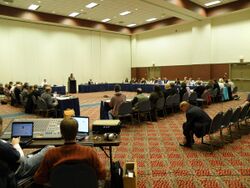Academic Senate
Topic: Social
 From HandWiki - Reading time: 3 min
From HandWiki - Reading time: 3 min
An academic senate is a governing body in some universities and colleges, and is typically the supreme academic authority for the institution.[1]
Scotland
In Scotland, the senatus academicus is the supreme academic body of an ancient university, given legal authority by the Universities (Scotland) Acts. The senatus is responsible for authorising degree programmes, issuing degrees to graduands and honorary recipients, and for the discipline of students. Membership includes ex officio and elected members, and generally comprises:
Ex officio
- The Principal (President of the Senate)
- Vice-principals
- The secretary of court
- Deans of faculties
- Professors of the university
- Heads of academic departments
- Directors of academic services (e.g. library)
- Student members
At the University of Glasgow, the Clerk of Senate (whose office is equivalent to that of a vice-principal) and Secretary of Court are also ex officio members of the Senate.
United States

In the United States of America the academic senate, also known as the faculty senate, is a governing body for a university made up of members of the faculty from various units within the university. In most cases administrative units such as human resources or other university support units do not have representatives as they are not scholastic units. Individual faculty or academic departments such as the Department of Biology or units such as the library may select representatives for the academic senate.
The academic senate normally creates university academic policy that applies to the university. The policy created by the academic senate is restricted to and must be congruent with policy by the university system of which the university is a member institution, any accreditation bodies, state laws and regulations, federal laws and regulations, and changes derived from judicial decisions at the state and federal levels of the court systems. While a majority of universities and colleges have some form of an academic senate, the general perception is that the organization has more of a ceremonial role. However some researchers have found a negative correlation between centralization of university administration and the presence of an academic senate indicating that an academic senate acts as an organizational force for the decentralization of a university in the area of academics.

The academic senate meets periodically with a published agenda. Meetings normally use Robert's Rules of Order. The senate will have a set of committees, both standing committees and ad hoc or working committees, which are assigned particular areas of responsibility for policy formation.

The officers of the academic senate may include the president of the university and the provost of the university. Other officers are academic senate members who are elected to officer posts by the members of the senate. Deans of colleges as well as department chairs may be ex officio members of the academic senate.
Motions, recommendations, or actions that are generated by the academic senate through discussion and which are passed by the body are never final and will normally be referred to the president of the university for final approval. Depending on the authorizing legislation or statutes and types of recommendations being made, boards of trustees, boards of regents or the equivalent may have to authorize senate recommendations.
See also
- Academic administration
- Ancient university governance in Scotland
- General council (Scottish university)
- Senate House (University of Cambridge)
- University council
- University court
References
- ↑ Birnbaum, R. (1989), "The latent organizational functions of the academic senate: why senates do not work but will not go away", The Journal of Higher Education (Ohio State University Press) 60 (4): 423–443, doi:10.2307/1982064
 KSF
KSF